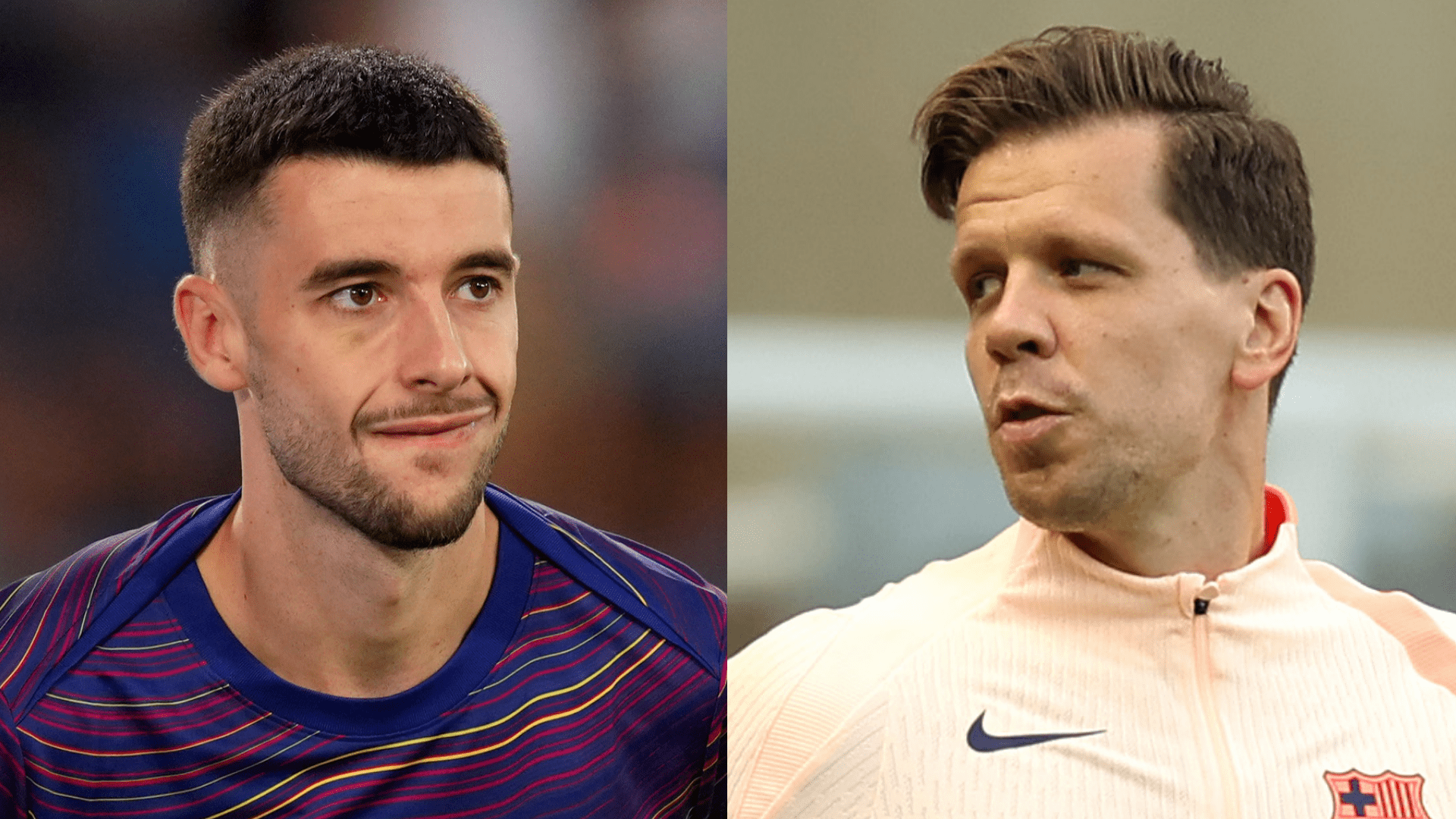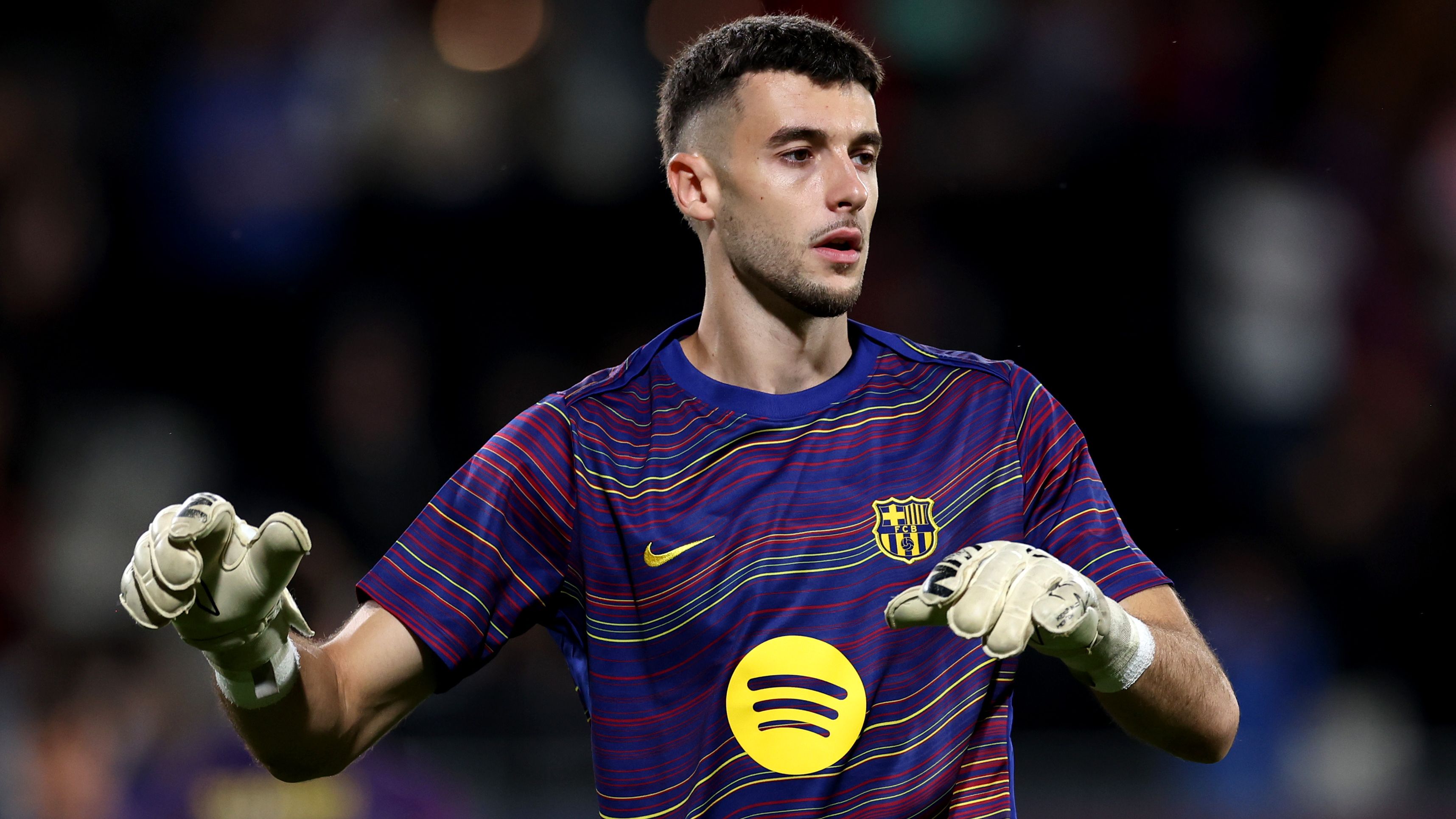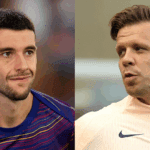


Szczesny’s Unwavering Support for Garcia’s Rise in La Liga
In the competitive world of football, where rivalries and ambitions collide, Wojciech Szczesny and Joan Garcia are crafting a story of mentorship and potential at Barcelona. This narrative highlights how a seasoned goalkeeper is prioritizing the growth of a promising talent over personal opportunities, especially ahead of the high-stakes Clasico against Real Madrid.
Szczesny’s Admiration and Commitment to Garcia’s Development
Joan Garcia’s move to Barcelona from Espanyol for a hefty €25 million stirred controversy, yet he rapidly captured the hearts of the fans through his standout performances. These displays underscored the reasons behind the La Liga title holders’ determined efforts to bring in this talented shot-stopper. On his part, Wojciech Szczesny, fresh from extending his contract with the club for another year, has openly committed to supporting the 24-year-old’s journey toward football greatness.
Insights from Szczesny’s Interview
During a conversation with the Polish outlet Sport, the former Arsenal and Juventus custodian shared his respect for the new addition. “I first noticed him playing for Espanyol last season, and he left a lasting impact on me,” he explained, emphasizing the young player’s abilities.
“Just after a few training sessions together at Barcelona, I realized I could play a minor role in nurturing what might become the top goalkeeper globally. He’s not at that level yet, but his potential is extraordinary. If I can assist him at all-whether for the team’s benefit or to know I contributed to this remarkable skill-it’s immensely rewarding, even if it’s just a small boost.”
The Setback in Garcia’s Promising Path
While Garcia enjoyed an ideal beginning at his new club, his progress hit a major obstacle. On September 26, during a routine practice, the 24-year-old sustained a torn meniscus. He underwent effective arthroscopic surgery immediately, but this injury kept him out for about a month, casting doubt on his availability for the intense Clasico showdown with Real Madrid on October 26.
Szczesny’s Hopes for Garcia’s Comeback
Wojciech Szczesny is eager for Garcia to recover fully before the crucial match. In his remarks to SportoweFakty, he said, “I truly hope he bounces back quickly. Personally, I’m not expecting to feature in El Clasico.”
“I cherish the straightforward nature of my bond with Joan. He’s fully aware of my position, and I aim to guide him toward peak performance. There’s no question in my mind about who deserves to be Barcelona’s primary goalkeeper-he’s got tremendous capabilities. I’ll admit I can offer some guidance, and I embrace this duty seriously. I want to eliminate any uncertainty; there won’t be any battle for the starting spot here.”
Barcelona’s Recent Struggles and Upcoming Challenges
Following their initial loss in La Liga this season-a decisive 4-1 defeat to Sevilla-Hansi Flick’s squad lost their lead in the standings to Real Madrid. The team is set to face another Catalan rival, Girona, on October 18, as they look to regain their momentum.
The Decision by Wojciech Szczęsny
Wojciech Szczęsny, the experienced Polish goalkeeper now playing for Barcelona, has stirred up quite a bit of conversation in the football world with his recent choice to step back from starting in El Clásico against Real Madrid. Imagine being a top-tier player and deciding not to take the spotlight in one of the biggest matches of the season-that’s exactly what Szczęsny did, all in the name of helping his teammate Joan Garcia reach world-class status. It’s a move that highlights the selfless side of professional sports, where mentoring can sometimes trump personal glory.
From what we’ve gathered, Szczęsny openly shared his reasons in Polish media, emphasizing his role as a mentor rather than a competitor for the spot. He talked about the importance of giving younger players like Garcia the chance to shine, especially in high-stakes games like El Clásico. This decision isn’t just about sitting on the bench; it’s about building the next generation of talent in Barcelona’s squad. Keywords like “Wojciech Szczęsny El Clásico” have been buzzing online, as fans and analysts debate whether this is a smart strategy or a risky gamble[başvurmak:[başvurmak:https://sport1.pl/szczesny-wywoluje-sensacje-w-barcelonie-zdradza-dlaczego-nie-chce-grac-w-el-clasico/].
Szczęsny’s stance has also sparked discussions about team dynamics at Barcelona. Reports suggest that while there’s some uncertainty about his final participation, his primary focus is on guiding Garcia. This kind of transparency from a player of his caliber-someone who’s been a key figure in big matches for years-really shows how mentoring can influence career paths in football.
Key Moments Leading to This Choice
Let’s break this down a bit. Szczęsny’s comments came right before the match, creating a buzz that even caught the attention of Spanish media. He revealed the behind-the-scenes rivalry and how he’s positioning himself as a guide for Garcia. It’s not every day you hear a pro athlete say, “I’d rather help my teammate grow than play myself,” but that’s the essence of what Szczęsny shared. This approach could be a game-changer for how we view leadership in sports, especially in intense rivalries like those between Barcelona and Real Madrid[başvurmak:[başvurmak:https://transfery.info/aktualnosci/juz-wiadomo-co-z-wojciechem-szczesnym-na-el-clasico/233019].
Benefits of Mentoring in Football
Mentoring isn’t just a nice gesture; it brings real benefits to both the mentor and the mentee, and in the context of Wojciech Szczęsny’s decision, it’s clear how this can elevate a team’s performance. For starters, when experienced players like Szczęsny step back to mentor someone like Joan Garcia, it fosters a culture of growth and development within the squad. Garcia gets invaluable hands-on experience in a high-pressure environment like El Clásico, which could fast-track his journey to becoming a world-class goalkeeper.
One major benefit is the transfer of knowledge. Szczęsny, with his years of playing at the highest levels, can share tips on handling pressure, reading the game, and even dealing with media scrutiny. This kind of guidance helps young talents avoid common pitfalls and build confidence faster. Plus, for the team as a whole, having a strong pipeline of players means better long-term success. Imagine Barcelona benefiting from a “world-class status” goalkeeper groomed through such mentorship-it’s a win-win for everyone involved.
- Skill Enhancement: Mentees like Garcia gain practical skills that textbooks can’t teach.
- Motivation Boost: Knowing a legend like Szczęsny is in your corner can be incredibly motivating.
- Team Cohesion: This approach strengthens bonds, reducing competition tensions and promoting unity.
- Legacy Building: Mentors like Szczęsny leave a lasting impact, ensuring their expertise lives on.
Real-World Impacts on Player Development
In football, mentoring has a proven track record. Think about how it helps in creating a more resilient squad, especially during injury-prone seasons or transitions. Szczęsny’s choice could inspire other veterans to prioritize development, leading to a healthier club culture.
Practical Tips for Aspiring Mentors in Sports
If you’re a coach, player, or even a fan interested in mentoring, Szczęsny’s story offers some great takeaways. First off, start by building trust-open communication is key, just like how Szczęsny has been upfront with Garcia. Share your experiences honestly, whether it’s through one-on-one sessions or team talks. For instance, Szczęsny could be advising Garcia on specific scenarios, like facing Real Madrid’s attack.
Here are some practical tips to make mentoring effective:
- Set Clear Goals: Define what “world-class status” means for the mentee, such as improving reaction times or decision-making under pressure.
- Provide Constructive Feedback: Always balance praise with areas for improvement, helping the mentee grow without discouragement.
- Lead by Example: Show commitment by stepping aside when it benefits the team, as Szczęsny did.
- Incorporate Training Drills: Use video analysis of past El Clásico matches to highlight key moments.
- Encourage Reflection: Have the mentee journal their progress, fostering self-awareness.
Applying these tips can turn mentoring into a powerful tool, not just in football but in any sport. It’s all about patience and dedication, qualities that Szczęsny exemplifies[başvurmak:[başvurmak:https://sport.fakt.pl/pilka-nozna/wojciech-szczesny-mysli-o-grze-w-el-clasico-odpowiedzial-w-swoim-stylu/7qfltwt].
Case Studies in Sports Mentoring
Looking at other examples, Szczęsny’s approach isn’t unique but echoes successful cases in football history. Take, for instance, how Petr Cech mentored Thibaut Courtois at Chelsea. Cech stepped back to let Courtois take the reins, resulting in Courtois becoming one of the Premier League’s top goalkeepers. Similarly, in Barcelona’s own history, players like Lionel Messi have mentored young stars, helping them adapt to the demands of El Clásico rivalry.
Another case is from the world of basketball, where LeBron James has often guided younger teammates, prioritizing team development over individual stats. These stories show how mentoring can lead to championship wins and personal growth, much like what Szczęsny aims to achieve with Garcia.
Lessons from These Examples
From these case studies, we see patterns: effective mentors focus on long-term benefits, provide emotional support, and create opportunities for real-game experience. For Szczęsny, this could mean Garcia emerging as a key player in future matches, strengthening Barcelona’s defense against powerhouses like Real Madrid.
First-Hand Experience and Reflections
Drawing from reported insights, Szczęsny’s own words paint a picture of his first-hand experience. He mentioned in interviews that he’s enjoyed watching Garcia grow, emphasizing how this mentorship has rekindled his passion for the game. It’s like he’s saying, “I’ve been there, done that, and now it’s your turn.” This reflection highlights the personal rewards of mentoring, such as fulfillment and legacy-building.
In essence, Szczęsny’s decision is a masterclass in putting the team first, blending his extensive experience with a forward-thinking mindset. By focusing on keywords like “mentoring Joan Garcia toward world-class status,” we can see how this story resonates with fans searching for inspiration in sports dynamics. All in all, it’s a reminder that true greatness often comes from lifting others up.









